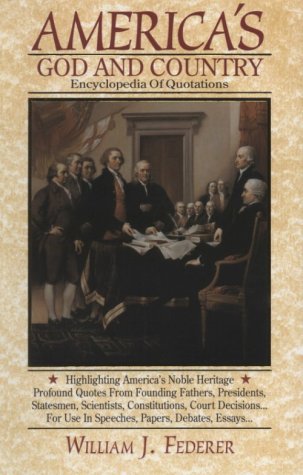 American Minute with Bill Federer: B
American Minute with Bill Federer: Born a slave in New York in 1797, she spoke only Dutch until sold around the age of 9, together with a flock of sheep, for $100.
Suffering hardships, her third master made her marry an older slave with whom she had five children.

In 1827, she escaped to Canada.
After New York abolished slavery, she returned as a domestic servant and helped with Elijah Pierson’s street-corner preaching.
Her name was Sojourner Truth.

In 1843, Sojourner Truth heard “a voice from Heaven” and began spreading “God’s truth and plan for salvation.”
In Massachusetts, she worked with abolitionists William Lloyd Garrison and Frederick Douglass.
After the Emancipation Proclamation, Sojourner Truthmoved to Washington, D.C., met Lincoln and helped former slaves.
 Get the book, America’s God and Country Encyclopedia of Quotations
Get the book, America’s God and Country Encyclopedia of Quotations
Sojourner Truth dictated her biography, The Narrative of Sojourner Truth: A Northern Slave(1850), stating:
“When I left the house of bondage I left everything behind. I wanted to keep nothing of Egypt on me, and so I went to the Lord and asked him to give me a new name.”

Sojourner Truth continued:
“I set up my banner, and then I sing, and then folks always comes up ’round me, and then…I tells them about Jesus.”
Her last full day on earth was NOVEMBER 25, 1883. Sojourner Truth would begin her messages:
“Children, I talk to God and God talks to me.”

Great Gift for Holidays! PRAYERS AND PRESIDENTS-Inspiring Faith from Leaders of the Past

Harriet Tubman (c.1820-March 10, 1913) was a former slave who repeatedly risked her life to free over 300 slaves from Southern Democrat slave plantations.

The trails she took became known as the Underground Railroad.
After the Civil War, she helped set up schools for freed slaves.

Harriet Tubman stated:
“I always told God: I’m gwine to hole stiddy on to you, and you got to see me trou … Jes so long as He wants to use me, He’ll tak ker of me, and when He don’t want me any longer, I’m ready to go.”

To her biographer, Sarah H. Bradford, Harriet Tubman related in 1868:
“‘Twant me, ’twas the Lord. I always told him, “I trust to you. I don’t know where to go or what to do, but I expect you to lead me,” and he always did.”
American Minute archives
Watch Faith in History
American Minute is a registered trademark. Permission is granted to forward, reprint or duplicate with acknowledgement